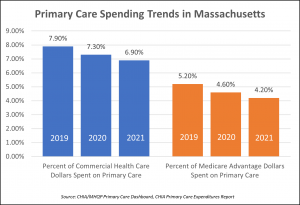We Need Bolder Actions to Take On Our Primary Care Crisis
(December 2023)
By Barbra G. Rabson
 In a post earlier this year, I noted the threat to the sustainability of our state’s health care system if it continues to prioritize spending on hospital care and underspend in primary care. Since then, I have been encouraged by some welcome indications that key leaders are recognizing the depth of the problem we are facing in primary care and are taking steps in the right direction to address it:
In a post earlier this year, I noted the threat to the sustainability of our state’s health care system if it continues to prioritize spending on hospital care and underspend in primary care. Since then, I have been encouraged by some welcome indications that key leaders are recognizing the depth of the problem we are facing in primary care and are taking steps in the right direction to address it:
- Barbara Spivak, the current President of the Massachusetts Medical Society and a former member of the MHQP board of directors, has sounded an alarm regarding the shortage of primary care physicians in the Commonwealth. Dr. Spivak writes: “The dearth of primary care physicians in Massachusetts is no longer a looming public health threat. It is here and represents a major public health crisis that requires urgent and sustainable financial investment and actions aimed at recruiting and retaining primary care physicians.”
- MassHealth has announced its plan to increase investment in primary care practices that participate in the Primary Care Sub-Capitation Program for Accountable Care Organizations (ACOs). Sub-capitation rates will increase 25% for adults and 35% for children for the underlying provider fee schedule used to develop sub-capitation rates. This is welcome news for independent primary care practitioners such as pediatrician Aaron Bornstein, who has been tirelessly advocating on this issue.
- Senator Cindy Friedman and Wayne Altman are championing Primary Care for You (PC4You), proposed legislation to increase Massachusetts’ investment in primary care from the 2020 level of 7.6% across all insurers to about 12 to 15% of overall health care expenditures by 2029.
- The U.S. Department of Health and Human Services (HHS) has released an issue brief outlining recent and planned federal initiatives federal agencies are taking to strengthen primary care.
These are signs that we are moving in the right direction, yet we are still falling behind. In 2021, the National Academy of Science, Engineering and Medicine (NASEM) released its report on Implementing High Quality Primary Care, calling for immediate action. It is now two years later, and primary care is in critical condition and deteriorating quickly. Access to primary care is now severely limited and spending for primary care is in a sharp decline.
Politico recently published an article entitled “No one’s promising you can keep your doctor anymore.” Last month, Massachusetts media reported that MassGeneralBrigham (MGB), the biggest and most well-endowed healthcare system in Massachusetts, has so few primary care physicians that many MGB sites are turning away new patients.
In a new report issued by the Primary Care Collaborative entitled Health Is Primary Charting a Path to Equity and Sustainability, the authors identify many supply-and-demand issues challenging the provision of relationship-based primary care. The report cites that Massachusetts has experienced one of the greatest net losses of primary care clinicians in the nation, an 18% net loss of primary care clinicians per 100,000 population.
We also know from the Massachusetts Primary Care Dashboard, which MHQP produces with the Center for Health Information and Analysis (CHIA), that primary care dollars as a percent of total healthcare spending for commercial insurers in Massachusetts went from 7.9% in 2019 to 7.3% in 2020 and then dropped to 6.9% in 2021 according to CHIA’s latest report on primary care spending. Even more alarming, the percent of Medicare Advantage spending going to primary care dropped from 5.2% in 2019 to 4.6% in 2020 and 4.2% in 2021. Primary care spending as a percent of total spending fell a full percentage point in two years for both commercial insurance and Medicare Advantage plans.

Despite growing awareness and momentum to support primary care, we are still chasing the problem as it accelerates. The Massachusetts Health Policy Commission (HPC) listed strengthening primary and behavioral health care as one of its nine policy recommendations in its 2023 Health Care Cost Trends report. But, given the urgency of the situation in Massachusetts and the HPC’s welcome focus on health equity and affordability, we need more targeted action.
This is a real crisis, and we have already crossed a line from which recovery will be difficult. While I am heartened by the increased attention primary care is receiving in our state and nationally, I am concerned that our steps are not strong enough to meet the moment and match the speed of decline. We need to work together and take bold action to address this crisis.
